#not to harp on this again but I would argue despite having similar roles as children supporting the protags and acting as
Text
truly do find 'perfect' sweet little kids who exist to be cute and protected extremely boring to the point of aggravation but alluka DOESN'T fit that description because she's been neglected and isolated her whole life, she is soul-bonded with a horrifying (to many) and nearly omniscient being, she is endlessly sweet and loving to really only one person, and she STANDS UP TO that person when he hurts someone else she cares about!! she may not have a lot going on but her character and personality contrasts her situation so much to make it really striking. and I'm a sucker for close brother/sister relationships!! so sue me!!!
#not to harp on this again but I would argue despite having similar roles as children supporting the protags and acting as#characters whose very existence means important plot or character things regardless of their personalities#alluka IS better-written than a-yuan. there is genuine conflict there. she has her own loyalties and motivations#on a plot level she may exist to 1. solve a problem 2. separate killua from gon and 3. introduce DC magic#but it doesn't feel like she exists to simply fill a shallow shipping-adjacent role quite so blatantly#or maybe I'm biased against using kids as shipping fodder.#or reducing an entire murdered family to one kid who's only referred to as the son of two unrelated characters. and whose survival#is only of value bc it helps gets them together idk!#I also really dislike how 'good' kids are treated by the narrative.#etc. etc. anyway authority figures and her own parents and siblings hate and fear and disrespect and misunderstand alluka.#and they are wrong! fuck them! it's always felt like togashi's had the backs of the kids he writes#it's um. anti-authoritarian not rly in its themes but in its general approach I think?#hm. can't rly elaborate rn as im sleepy#but alluka's sweetness isn't grating or irritating it's a breath of fresh air in the nightmare that is her home life#and it's a precious and wonderful thing to see her so affectionate with a character we the audience love so much but who has struggled#for so long to leave his past behind and do be a normal kid#her love and her kindness isn't empty or meaningless it's the lifeblood that killua needs to#have a healthy relationship w his best friend#bc it lets him step back and have more than one important person in his life#and he sends that love right back to her!!!! killua isn't just someone starved for love he's starved TO love!#the unconditional love the rest of his familiy has long denied him....he and alluka and nanika all find it with each other#and it's the most beautiful and special thing in the entire series I think. or one of them#cor.txt
5 notes
·
View notes
Text
BtT Light Novel Club Chapter 20 (Part 2): Tearmoon Empire, Vol. 1

And here is the second part of our discussion on the light novel Tearmoon Empire, Vol. 1! If you haven’t yet, please check out Part 1 of our discussion first.
We’ve got a lot to talk about, so let’s jump right in! Just like with Part 1, Jeskai Angel and Gaheret are joining me in the discussion.
-----
4. Is there a “god” in this story?
Jeskai Angel: It would easier to write off references to deity as a way to evoke Roman Catholic France…if there weren’t so many examples. One of the last things OG Anne says to Mia in the original timeline is, “I pray that the gods will smile upon you. May you go with their blessing.” Immediately afterward, Mia dies and travels back in time. Coincidence? Ludwig thinks “Surely, she is a great leader bestowed upon us by the heavens…” The narrator makes light of this, but is attributing the situation to a god really so farfetched? Mia died then traveled back in time eight years, accompanied by a diary stained by her own blood. How? Why? While gods don’t come up in a major way, the visit to the church in the slum is another reminder of religion. After Mia arrives at the academy, the escort captain says “May God be with you in your new life at the academy.” Well, Mia is living a “new life” in more ways than one, and again I must ask: how? I couldn’t help but ponder whether the chill Mia feels when she almost ignores Tiona, that sense that she was at a crossroads, “almost as if… As if the decision had already been made,” might be providential guidance. The narrative here doesn’t mention any god, so maybe I’m reading too much into the scene though. On various occasions people compare Mia to the moon goddess, which doesn’t prove much, but is another way the story keeps reminds us about the idea of gods.
There’s also the Duchy of Belluga / its ruler. They form a clear analogue to the pope / the territory historically ruled by the pope, sometimes called the Papal States. It’s played for humor when Mia writes in her diary, “Basically, being the wise person that I am, God in all His Greatness saw fit to make me the chosen one…To put it simply, it is my duty to save the Empire.” Leaving aside the “wise person” bit, remember we’re dealing with postmortem time travel. Is it really that unreasonable for Mia to see divine providence in this?
Again, maybe all these examples are just meant to give the setting the flavor of eighteenth century Roman Catholicism and don’t imply anything about an active role for deity in the story. But I wonder.
Gaheret: I think that there are three ways religion is present in the story: first, as all time travel stories (I would argue), this is a story concerning a fate or vocation. In this case, it is a vocation. Mia is called to be a force for good, and directed towards that end by Providence. And there is a physical reminder of that mission: the diary. I find it sort of odd that the diary would keep changing, taking into account what she does to the timeline, yet she does not expend all day reading it and searching for a way to change what will happen the next day, given her approach to the rest of what is happening.
The other two are: as a force for justice and charity, which clearly presides both the approach of Rafina and that of the international church which aids in preventing the plague and adopts an orphan boy. Placed at the slums, it works for the poor.
And as a political force, given its role in Rafina´s kingdom. We still don´t know the specifics, it is true. There is a moment when Mia is on the verge of praying, but she does not, and as Jeskai notes, at first she comically reflects that she is chosen by God. Which, being this kind of story, must be literally true. I wonder what will happen if Rafina, Keithwood and the rest will think if they learn of Mia´s experience, and how will they square it with the rest of their beliefs, of which we do not know much.
stardf29: Well, when it comes down to it, there are two clearly supernatural elements in play in the story here: Mia’s return to the past, and also the diary that tells her how events will lead to her execution, which even changes as she performs different actions to account for those and show how they might still lead to doom. With no other obvious magical elements in the story, I have to assume that there’s at least some “god” that is at work here.
The question then is, based on that assumption, how much that god is like the Christian God. The thing here is, we have a situation where this “god” seems to have turned back time in order to change the course of history. Now, the whole concept of time travel is one that is very hard to grasp due to how it seems nearly impossible in real life, to say nothing of its philosophical/theological implications. Is this an actual rewind of time? Is this an alternate universe that had followed the same events of history until the point where Mia basically gains the knowledge of events in a parallel universe? Or was Mia’s past life beyond her reincarnation point basically just one long and extremely visceral prophecy that never actually happened, which was shown to her alongside the diary in order to avert a terrible fate? Each one would have different implications on what the “god” of this world is like. And really, at this point, I have no idea what the case is here. I’m definitely curious on this point, but for now, I can at least appreciate that there are higher powers in play here.
Jeskai Angel: I found it curious that throughout the book, there seemed to references to a variety of deities. One is just called “God.” Another is identified as the “moon goddess.” And there’s also broader mention of “the gods.” It’s unclear to me for now which if any of these is actually “real” in-story.
5. This novel seems to take inspiration from European history, particularly the French Revolution. What do you think about the similarities and differences between the story and the history of our world?
Jeskai Angel: Tearmoon Empire uses its background material quite well. This is not historical fiction, thankfully, just fiction loosely inspired by history. The author paints in broad strokes, piggybacking on popular knowledge of the French Revolution to help tell the story, without being slavishly beholden to historical minutia. A great example of this is the “Let them eat meat” quote attributed to Mia. Marie Antoinette never said “Let them eat cake,” but the quote is so strongly identified with her at a pop culture level that putting a paraphrase of it in Mia’s mouth becomes an effective way to tell readers Mia should bring to mind this historical figure. The rest of the book is similar, using historical allusions or resemblances to give readers a feel for the setting and characters.
I also love the overall premise, using fiction to give a happy ending (or so we hope!) to a tragic historical figure. About a decade ago, I took a course on the French Revolution at FSU, under Professor Rafe Blaufarb. It was my first time studying the French Revolution in any depth, and I came away feeling a lot of sympathy for Louis XVI and Marie. So a story where Marie Mia goes back in time to avert the revolution strongly appeals to me.
stardf29: All I’ll say here is that, whereas it seems like for you two, your interest in the French Revolution got you more interested in Tearmoon Empire, for me, it was the opposite: Tearmoon Empire got me more interested in the French Revolution. So that’s +1 for light novels encouraging academic learning. Yay!
Jeskai Angel: I like that Mia and the Tearmoon government more generally are not simplistically presented as evil. Some are rotten apples, as we see at the highest levels of the nobility, but they weren’t all horrible people. Some, like Ludwig, meant well but lacked power to effect change. Some, like Mia, simply aren’t equipped to deal with the disaster. She was selfish and arrogant in her first life, but hardly a monster. It’s impossible to celebrate her death as the story opens, only pity her. Especially in the first timeline, Mia was flawed yet also faced unfair condemnation. This again fits nicely with history. Despite a few philosophers braying about absolute monarchy, in actual practice Louis XVI’s power was far from absolute. (If France really had been an absolute monarchy, maybe the revolution could have been prevented!) Like Mia, Louis and Marie were not educated and equipped to deal with the challenges they faced. Many of the problems related to the revolution preceded them or were beyond their control. They were flawed and made mistakes, yes, but they weren’t evil monsters who deserved to die.
Gaheret: Yes. And even if that was not the case, the tyranny of the revolutionaries was far worse than that the government of the Monarchy. It actually lead to a period of madness and totalitarian terror, followed by an actual Emperor, Napoleon, that created an actual secret police, tried to conquer the world and assasinated the Duke of Enghien. Among other things, because the old France, with all its flaws, actually had some checks and balances between aristocracy, monarchy, the cities, the customs, the Church…
Jeskai Angel: True. So much unnecessary bloodshed and death.
Gaheret: Discrimination among the three states was one thing. A national Church, the Terror and the massive murder of priests, nobles and people of La Vendee was another, and far worse.
In the case of the Tearmoon Empire, things may be more different, but I´m all for Mia.
6. To what extent do you consider Mia “selfish”? Does her acting primarily out of self-interest diminish the value of her actions?
Jeskai Angel: This comes back around to the issue we keep harping on, that Mia is an impressively realistic example of how complicated we humans are. Undoubtedly, some of what she says and does is ultimately motivated by selfishness. Where the narrator goes wrong, in my view, is in talking as if that selfishness negates everything else. She was selfish, period, end of story. I don’t think that works.
When Mia drags her retainers to the slum and gives away an expensive piece of jewelry to help fund medical care for the indigent, there was certainly some selfishness involved (e.g., I don’t want to die on the guillotine again). But as you read her words on this occasion, is it really plausible that she was acting for purely selfish reasons and completely inadvertently spoke in a way sounded more benevolent? Again I remind the jury that the narrator never suggests Mia was a liar who schemed to trick people into thinking she was kind and good. The narrator just claims Mia is a doofus who expresses herself poorly.
When Mia first encounters Tiona and stands up against the bullies, there was certainly some selfishness involved (e.g., I don’t want to die on the guillotine again). But as you read her words on this occasion, is it really plausible that she was acting for purely selfish reasons and completely inadvertently spoke in a way sounded more benevolent? Again I remind the jury that the narrator never suggests Mia was a liar who schemed to trick people into thinking she was kind and good. The narrator just claims Mia is a doofus who expresses herself poorly.
What is more plausible? That Mia is such a derp that she tries to be selfish and keeps failing at it by accidentally sounding wise and compassionate without meaning to? Or that she isn’t purely selfish and her fine-sounding words and deeds are more genuine than the narrator, and perhaps Mia herself, realize?
I think again of the how before Abel’s fight, Mia tries to think of something clever and diplomatic to say…and then wishes him victory, and, according to the narrator, “let slip her true thoughts.” There’s something similar in the scene where Mia tries to convince herself that Abel is just a little kid and there’s nothing special about being with him, and is puzzled with herself as to why she would be so flustered. Is it not reasonable to suppose to that on other occasions, too, Mia’s motivations may have been less purely selfish and more complex than she and/or the narrator realize?
I think of Jesus’ teaching that a tree is known by its fruit. Mia promotes Anne and protects her from workplace harassment. Mia prevents a good civil servant from losing his job and being banished to the hinterlands for trivial reasons. Mia personally leads an effort to provide medical care for the poor by visiting the slum with her retainers and donating that valuable jewelry. Mia saves Elise’s life by becoming her patron and ensuring she’ll have the income she needs to survive. Mia protects both Tiona and Abel by standing up to bullies (notwithstanding how cowardly the narrator says she is). Mia befriends friendless Chloe. Would a person who isn’t good, and who isn’t trying to look good in front of others, really say and do all this stuff? Going by the “fruit test” Jesus taught, I feel compelled to suspect there’s more good in Mia than she or the narrator are willing to admit.
Yes, there’s some selfishness or other ill motives mixed in, but the same is true for every one of us. Why do we obey God? Because we fear God’s judgment? Because we love God himself? Because we want to avoid a guilty conscience? Because we want to go to heaven? Because we want to look like good people to others? Because…etc.? Who but God can hope to answer these questions? But if partially tainted motives are enough to devalue one’s actions, then nothing anyone does ever has any worth. This is part why reading this book was so powerful for me. As I read this work of fiction, I can see how wrong it is for the narrator to harp so much on Mia’s flaws & use them to ignore or minimize her virtues. And I could see that the same is true of myself. Do I ever act out of purely virtuous motives? Probably not. But that doesn’t justify treating everything I do as having diminished value. I want Mia’s good deeds to matter, despite her selfishness and other flaws, because I want my efforts to do good to matter, despite my selfishness and other flaws.
Gaheret: I would add that, apart from these signs that she cares for others, Abel and Anne especially, saving yourself of three years of imprisonment and of being unjustly condemned to the guillotine is a perfectly reasonable thing to do. The narrator may say that she is a chicken, but it’s not him (presumably) who may go to execution at twenty. But the important thing, in my view, is that she is growing. If she sometimes does good deeds without realizing or intending them, that’s a sign of hope that one day she will, and a gift, too. I am interested in seeing her triumph against her defects, but I find her to be a very enjoyable character just as she is.
stardf29: Okay, so the reason I asked this question was because this book made me think of something. Mainly: is it really that bad to be self-interested? After all, one can argue that all of our actions, even our most “selfless” ones, are ultimately done in our self-interest: we help others at the expense of our short-term interests because we believe doing so will be better for us in the long term. Even something like following Christ and living a Christian life is something Christians do because we believe it is both the best way to live our present life, and also because we believe in great things in the next life.
Maybe, what we think of as “selfishness” is really just “short-sighted self-interest”: doing things only for what we can gain in the short term, without thinking about how it might ultimately hurt us in some way or another. And that leads us to Mia…
Mia’s actions might be supposedly “selfish”, but what is the big difference between her actions in the current timeline versus the past? It’s that now, she’s acting with a far more long-term view of things, in particular how certain actions made with short-term gain in mind may lead to her head rolling in the future. And with that view in mind, the vast majority of her self-interested actions become very helpful to the people around her as well as herself. And that view, likewise, kickstarts her mind into starting to be considerate of others.
The fact that she’s still mainly thinking of her own interests makes for some good comedy, but I think it also reveals an interesting truth in that being self-interested isn’t bad in and of itself. The key is what we decide our self-interests are, whether they be short-term benefits that can bite us later in life, or long-term goals that help us grow and prevent (sometimes literally) painful regrets. And while Mia has room to grow in this way, having a self-interest of “avoid a revolt that will get my head chopped off” is quite a huge… head start.
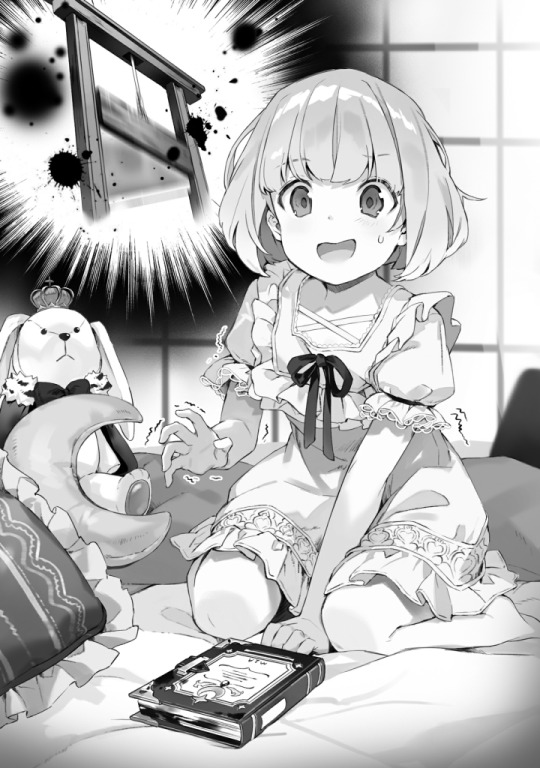
…I don’t think Mia liked that pun. My apologies.
On that note, one specific example that sticks out to me right now: Mia selling her prized hairpiece in order to help fund a hospital. Her motivation might have been as simple as “that way it won’t end up in the hands of those horrible revolutionaries”, but in that moment, Mia has grasped one of Christianity’s big teachings: the impermanence of physical possessions. Heck, that’s something even I admittedly struggle with sometimes, and Mia has grasped that concept pretty much perfectly. I can’t see that as anything but admirable.
Jeskai Angel: I think maybe the difference between enlightened self-interest and selfishness is not time (i.e., long-term vs. short-term benefits), but that the former does not exclude looking out for the interests of others, and the latter does. A person can act partially out of self-interest without elevating their interest above the good of everyone else, but a truly selfish person is always willing to prioritize themselves over anyone else.
stardf29: I agree with you, but that does bring up an interesting thought: perhaps always prioritizing ourselves over others is the most damaging thing we can do to ourselves.
Also, when I say “short-term” versus “long-term”, I’m not strictly speaking about time, but “scope” in general. Which includes more than just time, but also things like our emotional well-being and other psychological factors that one could probably do an entire graduate thesis on. There’s probably a better phrase than “long-term/short-term” here…
Jeskai Angel: Maybe “long-term” = effort to consider all the consequences, “short-term” = paying attention only to desired consequences?
Gaheret: Well, Aristotle would say that we always move when attracted by goods, which are goods for ourselves and also open to others, as common goods. Freedom consists in the ability to choose one of these goods over others, and a good use of freedom would be the “right reason”, which brings us to the best we can achieve, integrally considered. Good things usually give us some pleasure and are also beneficial in the long term, because they are in accord with our nature. Beyond Aristotle, one could say that such a decision can also be a vehicle of love: you choose to bring good things to your friends that you share, in a way, to remove obstacles, to enjoy reality… Ideally, growing in virtue means also learning to be attracted by higher goods and enjoy them more fully. So, there is always some good for us, direct or indirect, in helping others. We are not totally disinterested: only God is, because God does not need anything, and gives of His abundance.
So, in this view, the problem with being an egoist is that either one does not follow the right reason because of a blind spot concerning others, as in the one who eats all the cake when it would be best to enjoy it together, or that one loses part of the good he could enjoy. For example, if Mia defends Tiona without thinking about Tiona herself, she gets less of that interaction that if she appreciated the good there is in defending others when they need it.
This sometimes happens to her, but less and less. She is not so clueless now, and growing.
7. What are your favorite quotes or moments from the novel?
Jeskai Angel: How am I supposed to answer this?! There are SO MANY wonderful lines and scenes in this book. For sheer awesomeness, I think it’s hard to top the scene where Mia rescues Tiona from the bullies:
“Excuse me, but what exactly are you girls doing? …It seemed to me that you were behaving rather rudely toward one of my subjects. …You see, I love all my subjects, and I love them equally. Even the child of the poorest beggar shall not be denied my affection. No matter who they are, so long as they belong to the Empire, I will not condone any discourtesy toward them.”
If any scenes rivals the above, it might be the duel between Abel and The Artist Formerly Known As Remno’s First Prince, especially after Abel hears his brother trashtalk Mia and threaten to abuse her:
“‘You can call me whatever you want. Mock me. Insult me. I don’t care. But,’ Abel stared at his brother with a piercing gaze, ‘if you say one more bad word about Princess Mia…’ He thought of the girl known as ‘the Great Sage of the Empire.’ He thought of the light she’d brought to his world. For her to be robbed of that radiant aura… Was absolutely unacceptable. …’I won’t allow you to insult her any further!'”
Cue the OHKO.
On a humorous note, I’ll offer the scene before that fight: “Mia didn’t actually think badly of Abel’s brother. She… didn’t think anything of him at all, in fact. She’d completely forgotten he existed until this very moment.” What makes this so great is that throughout the book, Mia keeps forming connections she didn’t have in her first life, seeking allies, making a point of remembering names and faces; she is far more humble and caring and interested in other people than she was in her first life. She even remembers the names of other people’s servants! The ONLY person in the whole story she so completely disregards in her second life…is Abel’s brother.
Gaheret: When the worldbuilding started becoming evocative and unique for me: “The Azure Moon Ministry was the administrative agency for the capital city. The Golden Moon Ministry handled taxes. The Scarlet Moon Ministry was the administrative agency for the surrounding rural regions. The Jade Moon Ministry handled foreign affairs. Finally, the Ebony Moon Ministry commanded the seven armies of the empire”.
Despite not liking Sion on the whole, I agree with Jeskai that this fragment about him is quite compelling:
“To Sion, the ability to feel righteous fury — to be justly angry in the face of evil deeds — was an essential quality for those who reigned over the people. However, how many people could truly empathize with the suffering of others? How many could go as far as to feel anger as if they themselves had been wronged? Even Sion, who had been ready to step in himself, would have done so out of a sense of duty. It came from the mind, not the heart. Faced with Mia’s genuine anger toward injustice, he felt that he saw in her the makings of a ruler who truly lived up to his ideals”.
“Sion Sol Sunkland was born the eldest son of the King of Sunkland. “He who reigns over the people must believe firmly in fairness and hold justice close to his heart.”
This was funny, too:
“Unbeknownst to her, the “knowledge” that she was counting on was entirely based on the romance novel Anne’s sister had written. In other words… Not once did she suspect that Anne — five years her senior — was a complete novice at relationships who had never herself been in love before. “How promising,” she said, completely unaware of her terrible misconception. “With you at my side, Anne, I feel as though I’ve gained an army ten thousand strong!”
This was a great way to introduce a character:
“Abel Remno knew he was a loser. Likewise, he knew Remno was a second-rate kingdom. It possessed neither the rich history and tradition of Sunkland nor the sheer might of Tearmoon. Outmatched by even Belluga in influence and authority, it failed to garner any real respect from its neighbors”.
And this one, again about Abel:
“He focused every ounce of his efforts on one single thing. He raised his sword, and he swung it down. He repeated it. Then he did it again, faster. And faster. He devoted all his time to honing the motion. Ever since the night of the dance party, he’d done nothing else. Day after day, he poured his heart and soul into practicing that one swing. And now, after all the sweat and fatigue and pain, it was time. He swung. Today, he would conquer genius. Today, he would slay a god!”
stardf29: So as I mentioned earlier, one of my favorite moments is when Mia sold her beloved hairpin in order to help fund a hospital to prevent a plague. Two great quotes to go with this moment:
“No matter how precious the item, no matter how closely you try to hold onto it, there will be a day… It may go missing, or it may break… but its time will come. Knowing this, the most we can do is to use it well, and thereby give it meaning.”
And then, for something on the funnier side:
And not only was it stolen, it was stolen by a hooligan of a man, rude and violent and with entirely too much beard to be proper. Not that it’d be okay if she was robbed by a handsome fellow with a dashing crop of finely kempt hair, but anyway…
And then a bit later, during a tea party:
“Whatever I did, I did following my heart. There’s no deeper meaning to it than that.” Which was really just a more diplomatic version of, “What? I did it ’cause I wanted to. Got a problem with that, punk?”
Later on, Mia forgives a horse for sneezing on her:
“Oh please. Why would I possibly want to have a horse killed over a dress?”
For Mia, it was extremely obvious which one was more valuable. A dress couldn’t help her run from the revolutionary army. A horse could.
And, finally, the one point where I am in complete solidarity with the narrator:
Anne and Tiona seemed equally mesmerized by the two princes as they watched with wide, spellbound eyes. As for Liora… She poked at the meat in the sandwich, confirmed that it was well-roasted, and nodded to herself in satisfaction.
Liora, you see, was a girl who knew what was important.
8. Final Comments
Jeskai Angel: I want to express how greatly I appreciated many-short-chapters format of the book. So many LNs have like three 80-page chapters, and it’s stupid. Like, if the chapters are obnoxiously long, why bother with any chapter divisions at all? As Tearmoon Empire demonstrates, chapter divisions are not some kind of natural resource that needs to be rationed. The capacity to include another chapter break in a book is never depleted. Please, authors the world over, if you’re reading this, I beg of you, write using more but shorter chapters. Please and thank you.
stardf29: I think the whole “having lots of chapters” thing is left over from the novel’s origins as a web novel, where it’s more natural to just post a small chapter regularly. Though many such web novels, upon transitioning to light novel form, get several small chapters combined into larger chapters. So this might be more of an editorial decision. Maybe it’s because in Japan, light novels are still a largely physical medium, and combining chapters saves paper by reducing page breaks? It’s definitely better for e-books to have more chapters because it’s easier to jump to a specific part of the book with hyperlinked table of contents.
Whatever the case, looks like Tearmoon Empire kept all of its chapters in the transition to light novel form. Maybe it’s because each chapter has a witty little title? So maybe the real advice is not just to write lots of small chapters, but to give each chapter a title so that your editor has a reason not to combine them all into larger chapters.
Gaheret: I can´t wait for the next volume! I want it to go full French Revolution.
Jeskai Angel: According to the Amazon page for vol. 2 (which becomes available 19 July), the next book does feature a revolution.
Earlier when we were speculating about the narrator, someone (Gaheret, I think?) suggested the narrator might be an older Mia in the future. But I remembered a certain comment by the narrator, about how Mia disliked her bad ending so much, she restarted the whole game to play over again. It’s an obvious video game joke. But assuming Mia’s world is reminiscent of late 18th/early 19th century France, an older Mia wouldn’t have the frame of reference to make such a comment.
stardf29: Ah yes, there is that to take into account. So… maybe the narrator is one of Mia’s descendants, after Mia has told of her story to her family and they started to realize how things got misunderstood, and then as her story continued to be passed down the generations, that sentiment that she was “misunderstood” also got embellished. In this way, the somewhat unreliableness of the narrator can be explained.
As a final comment for me, I should say that I really like the illustrations in this volume. They are clean, cute, and show quite a lot of emotion. I definitely wish there were more of them, but we still got a good batch here.
=====
Whew, that was a lot to talk about! Of course, we would love to hear what you think about the novel, so post your own answers and thoughts in the comments!
As a reminder, we will be discussing Infinite Dendrogram, Vol. 4 next! The discussion for that will be posted on June 23rd. See you then!
#Light Novels#Christianity#Tearmoon Empire#Tearmoon Teikoku Monogatari#Articles#Author: stardf29#Author: JeskaiAngel#Author: Gaharet
3 notes
·
View notes
Text
8x05: Plot Analysis
Okay, so what did everyone thing of last night's episode? I actually really liked it. Lots of interesting tidbits. Like 8x04, there weren't tons of TD symbols, but what's happening in the narrative is super-important and I really like where this seems to be headed.
So let's talk most important first and then we'll move out from there.
*Major spoilers for episode 8x05: The Big Scary U. Don’t read until you’ve watched! You’ve been warned!*
Rick and Daryl's fight:
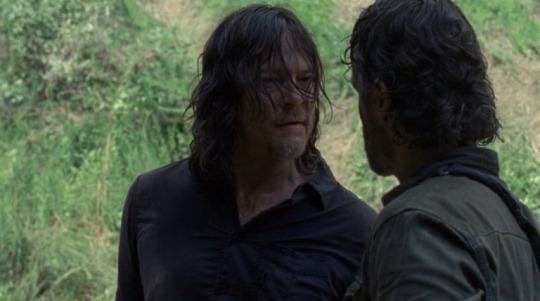
In my FB group, a lot of us are kind of pro-spoiler, so we've been discussing this up and coming fight most of the week. Why is it important? Because a break between Rick and Daryl is super important for Daryl's development. It's what will make him "go rogue" as Norman keeps putting it. It shows more of his brutality. Not only is he working against Rick, which is odd for him (in the past, even if he didn't totally agree with Rick, he still mostly backed him) but he's advocating actions that might get innocent people killed, which we've really never seen from him before.
It also shows where his head is at. I thought it was interesting that when arguing with Rick after the dynamite blew up, he said, "we have to win." Rick agreed, but they have different ideas of what winning entails. And this line goes back to what Maggie said to him in the cellar last season. She said she wanted to string the Saviors up too, but "we have to win. Help me win." So as Norman said when he was on TTD a few weeks ago, Daryl's just determined to win and will just bull through anything in his way. You can see how that could be a very destructive mindset.
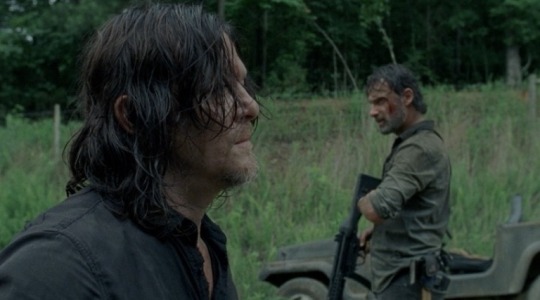
I'm honestly starting to wonder if Daryl will mirror Sasha, in that he'll go on a one-man mission to kill Negan, fulling expecting to die doing it. Not only is he willing to sacrifice himself for his family, but he's not really interested in living anymore. He's ready because he doesn't have much to live for at this point. But just before that happens, Beth will appear. That would make total sense.
Other things we've discussed where this fight is concerned:
1. Again, we're in a 180-degree opposite place from S4. Especially 4x16. Think of it this way. In 4x16, Rick and Daryl became "brothers." Since then, this is the first real rift we've seen between them. Yeah, Daryl was kinda snarky to Rick back in 5b. He was obviously pissed at him for some reason that was never actually explained in the show (*coughs Beth*). But he still had Rick's back. He still sacked Nicholas when he and Glenn fought. He certainly wasn't punching Rick in the face over it. Annnd remember that 4x16 is when the sheriff's hat was put on Beth. Just saying.
2. How alone Daryl is. This is something that definitely reaches back to Beth and S4. In Still, Beth called out Daryl for his greatest fear: being alone. She accused him of not letting anyone get too close because he's too afraid of the pain of losing them. He pretty much confirmed what she said on the porch later. She said he'd be the last man standing and that obviously disturbed and upset him. ("You ain't a happy drunk at all.") Since then, losing people he’s become close to is pretty much what Daryl's entire arc has been: loss. It started with Beth, of course, and her monumental loss, and how it affected him. But each time he started to move forward at all, such as befriending Denise, or trying to bring others into the community (Dwight), life just stomped all over him again and again.
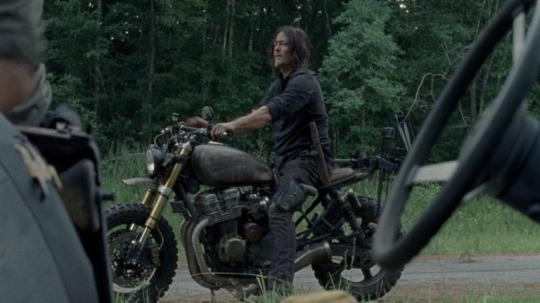
We've even discussed how his wardrobe change is symbolic of his character development. Since S2, his vest has been associated with him. Same with the sleeveless shirts he always wears (wore). Now his wardrobe has completely changed. Not only does he not have his vest, but he's wearing a very out-of-character shirt. Sleeves and all! We think that's to show that this isn't the Daryl we know and love. He isn't himself right now. He's undergone a 180 degree change from who he was in S4. Everything has been systematically stripped away from him, from friends and family to his bike and vest. There's almost no vestige of who he was. Him putting away Beth's knife shows that he's lost all the hope and positivity she instilled in him. And as she said, "If you don't have hope, what's the point of living?" So you can see how this is going to end up being a very destructive path for him.
Then, last season, when he hugged Carol, he was essentially saying goodbye to her. Given what we're seeing from Daryl this season, that was obviously very purposeful. His last true, close loyalties are to Carol and Rick. Though they're both still in his life, in terms of emotional solidarity, he's broken with both of them.
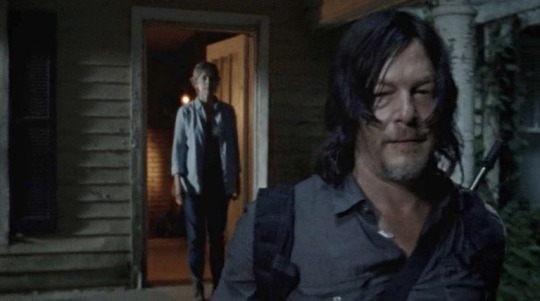
He's truly alone now. Which means the title of 4x13 was actually very symbolic and foreshadowed stuff that would happen seasons in the future. The two groups highlighted in the episode, Alone, were Bethyl and Maggie/Sasha/Bob. Sasha and Bob are gone now, but Maggie actually really thrives when she's on her own. She had to learn to lean on friends and family, rather than trying to do everything herself, but in a lot of ways, she's hopeful enough to thrive more on her own than when she had Glenn to lean on. So that episode was a foreshadow of her being without Glenn in the future. Then there's Daryl. He loses Beth in that episode, and he's so afraid of being alone that he falls in with a group he knows is toxic, because It's better than being alone. That episode was extremely symbolic of things we didn't actually see until S7 and S8.
So all of this is just to say that we're seeing symbolism being fulfilled here, much of which stemmed from S4 and Beth. So we ARE moving toward seeing her in the narrative. Just slowly.
3. Daryl's leadership role. We're really seeing him make his own decision here rather than falling into line with Rick. Don't get me wrong. We love when he and Rick are simpatico and do a symbolic fist-bump, but we've also thought for a long time that Daryl would eventually lead, independent of Rick, and we may be seeing the first steps of that here.
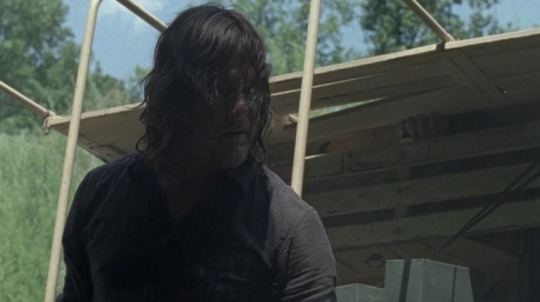
Not to mention, remember my sheriff meta about how 4a was one great big foreshadow? (HERE) Remember that when Rick stopped leading at the prison, Daryl stepped up into a leadership role. So again, we may be seeing a fulfillment of that here. Or at the least the beginnings of it. Again, this is the first time since 4x16 that Rick and Daryl have NOT been in sync, and that's a very important development in their relationship.
The Helicopter:
THAT was interesting, and something spoilers didn't mention. There was some talk on TTD of whether or not Rick hallucinated the helicopter.
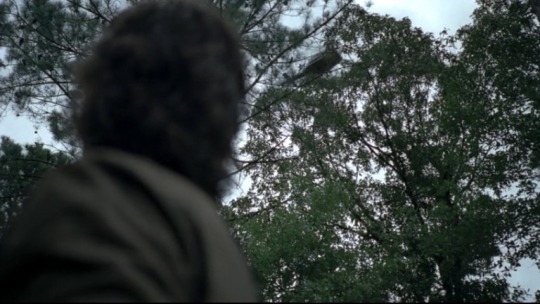
I think it was real. Nothing has happened in the story that would make Rick lose it. He lost it after Lori died, and other things might make him lose it later in the season, per the flash forward from 8x01, but we have no reason to not trust his sanity at this point in the story. I don't think Daryl hit him THAT hard. ;D
But then who does the chopper belong to? It's a mystery, because we haven't seen helicopters associated with any of these communities. Could be that one of them (like the scavengers for example) has one and we just haven't seen it before. But it's an interesting element to introduce at this juncture. I know TDers will want to hope Beth is on the helicopter. I actually don't feel like that's super-likely. Of course it depends on how the helicopter fits into everything else.
But it's the symbolism of it that I'm really side-eyeing. Let's refresh, shall we?
We saw a helicopter is S1 right after Rick left the hospital, so we've always seen it as a big part of the Beth/Rick getting shot/sheriff parallels.
We also saw a helicopter in S3, right before the Governor/Woodbury was introduced. And we could read a lot into that. In 3x01, the helicopter crashed, and then Merle (again, who disappeared for several seasons and was presumed dead) appeared. We could also connect it to Michonne, who traveled on the road alone for a long time before stumbling upon TF, and to Andrea, whose scars Beth has, as they were both focal points of that episode as well. But the resurrection of Merle is the big cheese there.
We also saw a helicopter crash on the roof of The Big Spot in 4x01, just as Beth's arc kicked off. All important details. So for them to randomly show us a helicopter now, when it feels like Beth is so close and Daryl is headed for a seriously bleak precipice? Yeah, that helicopter is definitely making me happy.
There were actually two major callbacks to Merle in this episode.
The first was the helicopter. The second, of course, was when Rick and Daryl fought and Daryl put Rick in a choke hold. That was callback to S1, when Shane put Daryl in one. Rick even took Daryl's line: "Chokehold's illegal, asshole." But that fight was about Merle and the fact that they left him behind in Atlanta, so to replay it now is really interesting.
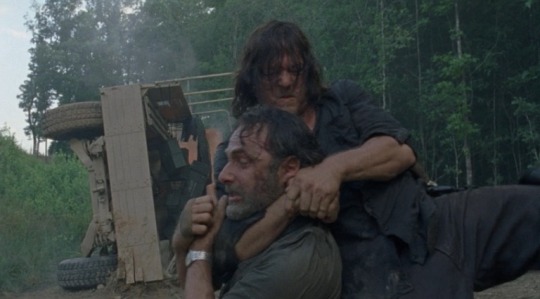
Also interesting to note that Daryl took Shane's roll in this sequence. More evidence of how destructive he's become. He totally went "full-Shane" on Rick.
I definitely do feel like this is a fulfillment of the weirdness we saw in 6x03.
I know I've harped on this a million times over the past year, but Daryl's behavior in 6x03 was just so weird and unexplained. He heard gunshots through his walkie and left Sasha and Abe to help Rick. Sasha was kinda pissed at him for that. Then we see him searching for Rick and being very worried because Rick isn't answering and he doesn't know where Rick is. Then he takes off, and it seems like he's still searching for Rick...except that instead he just goes back to Sasha and Abe. No explanation of his thought process or why he suddenly changed his mind. And going with Sasha and Abe, despite the fact that Rick needed him, led directly to him meeting Dwight.
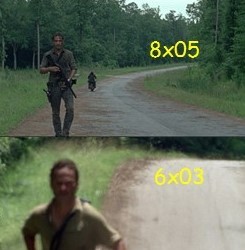
Now in this season, despite Rick needing his help with the plan to overthrow the Saviors, Daryl takes off by himself on his bike, on a very visually-similar road to what we saw in S6. And we know from spoilers (sorry, very minor spoilers follow) that he and Dwight will spend some time together later in the season. So symbolically S6 is being rehashed. And remember that it was only after Daryl came off his bike in 6x06 and met Dwight, that Glenn was revealed to be alive. So we may be looking at not seeing Beth until AFTER the Dwight/Daryl stuff.
Okay, I think I’m gonna stop there for today. This was the TD-heavy stuff that I saw. The Negan/Father Gabriel stuff was super-interesting, and gave us a lot of insight into Negan's psychology and background, but I'm not sure it had much to do with Beth.
So tomorrow I'll do a Details post which will include TTD (not much from TTD this week, but one thing in particular that stood out). Then for the rest of the week, I wrote up a bunch of theoriess over the weekend I'm excited to post. They aren't episode specific but are more about how much of the narrative is really coming together for us now, including Morgan/Beth entanglement, Terminus, and more on the Heron painting we saw in both Still and Mercy. Stay tuned!
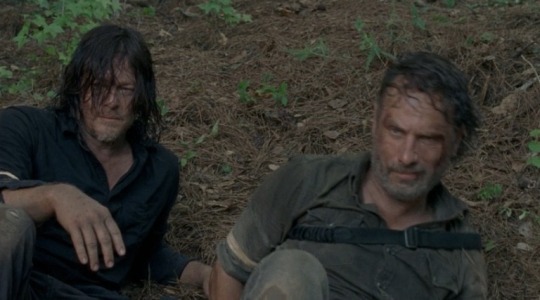
How did everyone else like 8x05?
#beth greene#beth greene lives#beth is alive#beth is coming#td theory#td theories#beth is almost here#team delusional#team defiance
23 notes
·
View notes